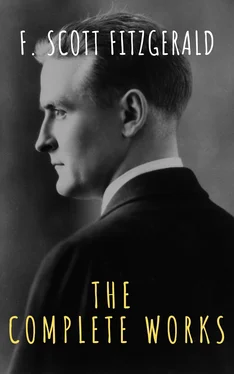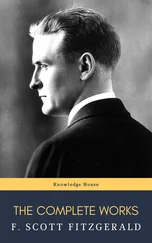Array The griffin classics - The Complete Works of F. Scott Fitzgerald
Здесь есть возможность читать онлайн «Array The griffin classics - The Complete Works of F. Scott Fitzgerald» — ознакомительный отрывок электронной книги совершенно бесплатно, а после прочтения отрывка купить полную версию. В некоторых случаях можно слушать аудио, скачать через торрент в формате fb2 и присутствует краткое содержание. Жанр: unrecognised, на английском языке. Описание произведения, (предисловие) а так же отзывы посетителей доступны на портале библиотеки ЛибКат.
- Название:The Complete Works of F. Scott Fitzgerald
- Автор:
- Жанр:
- Год:неизвестен
- ISBN:нет данных
- Рейтинг книги:5 / 5. Голосов: 1
-
Избранное:Добавить в избранное
- Отзывы:
-
Ваша оценка:
- 100
- 1
- 2
- 3
- 4
- 5
The Complete Works of F. Scott Fitzgerald: краткое содержание, описание и аннотация
Предлагаем к чтению аннотацию, описание, краткое содержание или предисловие (зависит от того, что написал сам автор книги «The Complete Works of F. Scott Fitzgerald»). Если вы не нашли необходимую информацию о книге — напишите в комментариях, мы постараемся отыскать её.
The first table of contents (at the very beginning of the ebook) lists the titles of all novels included in this volume. By clicking on one of those titles you will be redirected to the beginning of that work, where you'll find a new TOC that lists all the chapters and sub-chapters of that specific work.
The Complete Works of F. Scott Fitzgerald — читать онлайн ознакомительный отрывок
Ниже представлен текст книги, разбитый по страницам. Система сохранения места последней прочитанной страницы, позволяет с удобством читать онлайн бесплатно книгу «The Complete Works of F. Scott Fitzgerald», без необходимости каждый раз заново искать на чём Вы остановились. Поставьте закладку, и сможете в любой момент перейти на страницу, на которой закончили чтение.
Интервал:
Закладка:
In my credulous years—he thought—they told me that evil was a sort of dirty hue, just as definite as a soiled collar, but it seems to me that evil is only a manner of hard luck, or heredity-and-environment, or “being found out.” It hides in the vacillations of dubs like Charley Moore as certainly as it does in the intolerance of Macy, and if it ever gets much more tangible it becomes merely an arbitrary label to paste on the unpleasant things in other people’s lives.
In fact—he concluded—it isn’t worth worrying over what’s evil and what isn’t. Good and evil aren’t any standard to me—and they can be a devil of a bad hindrance when I want something. When I want something bad enough, common sense tells me to go and take it—and not get caught.
And then suddenly Dalyrimple knew what he wanted first. He wanted fifteen dollars to pay his overdue board bill.
With a furious energy he jumped from the fence, whipped off his coat, and from its black lining cut with his knife a piece about five inches square. He made two holes near its edge and then fixed it on his face, pulling his hat down to hold it in place. It flapped grotesquely and then dampened and clung to his forehead and cheeks.
Now … The twilight had merged to dripping dusk … black as pitch. He began to walk quickly back toward town, not waiting to remove the mask but watching the road with difficulty through the jagged eye-holes. He was not conscious of any nervousness … the only tension was caused by a desire to do the thing as soon as possible.
He reached the first sidewalk, continued on until he saw a hedge far from any lamp-post, and turned in behind it. Within a minute he heard several series of footsteps—he waited—it was a woman and he held his breath until she passed … and then a man, a laborer. The next passer, he felt, would be what he wanted … the laborer’s footfalls died far up the drenched street … other steps grew near, grew suddenly louder.
Dalyrimple braced himself.
“Put up your hands!”
The man stopped, uttered an absurd little grunt, and thrust pudgy arms skyward.
Dalyrimple went through the waistcoat.
“Now, you shrimp,” he said, setting his hand suggestively to his own hip pocket, “you run, and stamp—loud! If I hear your feet stop I’ll put a shot after you!”
Then he stood there in sudden uncontrollable laughter as audibly frightened footsteps scurried away into the night.
After a moment he thrust the roll of bills into his pocket, snatched off his mask, and running quickly across the street, darted down an alley.
IV.
Yet, however Dalyrimple justified himself intellectually, he had many bad moments in the weeks immediately following his decision. The tremendous pressure of sentiment and inherited tradition kept raising riot with his attitude. He felt morally lonely.
The noon after his first venture he ate in a little lunch-room with Charley Moore and, watching him unspread the paper, waited for a remark about the hold-up of the day before. But either the hold-up was not mentioned or Charley wasn’t interested. He turned listlessly to the sporting sheet, read Doctor Crane’s crop of seasoned bromides, took in an editorial on ambition with his mouth slightly ajar, and then skipped to Mutt and Jeff.
Poor Charley—with his faint aura of evil and his mind that refused to focus, playing a lifeless solitaire with cast-off mischief.
Yet Charley belonged on the other side of the fence. In him could be stirred up all the flamings and denunciations of righteousness; he would weep at a stage heroine’s lost virtue, he could become lofty and contemptuous at the idea of dishonor.
On my side, thought Dalyrimple, there aren’t any resting-places; a man who’s a strong criminal is after the weak criminals as well, so it’s all guerilla warfare over here.
What will it all do to me? he thought, with a persistent weariness. Will it take the color out of life with the honor? Will it scatter my courage and dull my mind?—despiritualize me completely—does it mean eventual barrenness, eventual remorse, failure?
With a great surge of anger, he would fling his mind upon the barrier—and stand there with the flashing bayonet of his pride. Other men who broke the laws of justice and charity lied to all the world. He at any rate would not lie to himself. He was more than Byronic now: not the spiritual rebel, Don Juan; not the philosophical rebel, Faust; but a new psychological rebel of his own century—defying the sentimental a priori forms of his own mind——
Happiness was what he wanted—a slowly rising scale of gratifications of the normal appetites—and he had a strong conviction that the materials, if not the inspiration of happiness, could be bought with money.
V.
The night came that drew him out upon his second venture, and as he walked the dark street he felt in himself a great resemblance to a cat—a certain supple, swinging litheness. His muscles were rippling smoothly and sleekly under his spare, healthy flesh—he had an absurd desire to bound along the street, to run dodging among trees, to turn “cart-wheels” over soft grass.
It was not crisp, but in the air lay a faint suggestion of acerbity, inspirational rather than chilling.
“The moon is down—I have not heard the clock!”
He laughed in delight at the line which an early memory had endowed with a hushed, awesome beauty.
He passed a man, and then another a quarter of mile afterward.
He was on Philmore Street now and it was very dark. He blessed the city council for not having put in new lamp-posts as a recent budget had recommended. Here was the red-brick Sterner residence which marked the beginning of the avenue; here was the Jordon house, the Eisenhaurs’, the Dents’, the Markhams’, the Frasers’; the Hawkins’, where he had been a guest; the Willoughbys’, the Everetts’, colonial and ornate; the little cottage where lived the Watts old maids between the imposing fronts of the Macys’ and the Krupstadts’; the Craigs’——
Ah … there ! He paused, wavered violently—far up the street was a blot, a man walking, possibly a policeman. After an eternal second he found himself following the vague, ragged shadow of a lamp-post across a lawn, running bent very low. Then he was standing tense, without breath or need of it, in the shadow of his limestone prey.
Interminably he listened—a mile off a cat howled, a hundred yards away another took up the hymn in a demoniacal snarl, and he felt his heart dip and swoop, acting as shock-absorber for his mind. There were other sounds; the faintest fragment of song far away; strident, gossiping laughter from a back porch diagonally across the alley; and crickets, crickets singing in the patched, patterned, moonlit grass of the yard. Within the house there seemed to lie an ominous silence. He was glad he did not know who lived here.
His slight shiver hardened to steel; the steel softened and his nerves became pliable as leather; gripping his hands he gratefully found them supple, and taking out knife and pliers he went to work on the screen.
So sure was he that he was unobserved that, from the dining-room where in a minute he found himself, he leaned out and carefully pulled the screen up into position, balancing it so it would neither fall by chance nor be a serious obstacle to a sudden exit.
Then he put the open knife in his coat pocket, took out his pocket-flash, and tiptoed around the room.
There was nothing here he could use—the dining-room had never been included in his plans, for the town was too small to permit disposing of silver.
As a matter of fact his plans were of the vaguest. He had found that with a mind like his, lucrative in intelligence, intuition, and lightning decision, it was best to have but the skeleton of a campaign. The machine-gun episode had taught him that. And he was afraid that a method preconceived would give him two points of view in a crisis—and two points of view meant wavering.
Читать дальшеИнтервал:
Закладка:
Похожие книги на «The Complete Works of F. Scott Fitzgerald»
Представляем Вашему вниманию похожие книги на «The Complete Works of F. Scott Fitzgerald» списком для выбора. Мы отобрали схожую по названию и смыслу литературу в надежде предоставить читателям больше вариантов отыскать новые, интересные, ещё непрочитанные произведения.
Обсуждение, отзывы о книге «The Complete Works of F. Scott Fitzgerald» и просто собственные мнения читателей. Оставьте ваши комментарии, напишите, что Вы думаете о произведении, его смысле или главных героях. Укажите что конкретно понравилось, а что нет, и почему Вы так считаете.












